Key Takeaways
- AI is revolutionizing finance by enhancing efficiency, reducing risk, and supporting better decision-making across banking, investing, customer service, and regulatory compliance.
- AI improves customer experience with 24/7 chatbots, predictive product recommendations, and personalized engagement.
- Key benefits include real-time analytics, lower operational costs, scalable data analysis, and increased decision-making and risk management accuracy.
- Challenges like high initial costs, data privacy, regulatory uncertainty, and system integration require careful planning.
- Jotform AI Agents help finance teams streamline processes, from loan applications to risk assessments, using no-code, customizable conversational forms trained on your business data.
Artificial Intelligence (AI) is rapidly changing various industries, including the finance industry. It’s changing the way we bank, invest, and more. With AI technology, machines can learn from data and simulate processes that humans usually do, like problem solving and decision-making. It’s also improving efficiency, reducing risk, and enhancing customer experience while giving businesses a competitive edge.
It’s an exciting time when it comes to this new technology. AI financial applications are already widespread, but they’re also evolving and having increasingly innovative impacts every day.
Build Your Custom AI Agent in Minutes
What is AI in finance?
AI in finance refers to how machines, computers, and technologies allow financial services operations to better operate, analyze data, engage with customers, increase safety, and more.
AI tools are changing the way financial markets operate. For example, generative AI, which can be used to create anything from text to images to audio to code, is heavily used in banking and insurance industries. Generative AI can analyze large amounts of data, helping businesses make well-informed strategic decisions. It can also help reduce human error for more accurate data and operations. AI can perform complex financial analyses, saving companies time and contributing to their overall strategy.
Applications of AI in finance
AI financial applications can support businesses in many ways. They also have a significant impact on customers, from increased financial security to smoother banking and investing processes.
1. Fraud detection and prevention
AI can be used to analyze data and identify unusual patterns which could signify fraud. For example, fraud detection AI can be used to analyze customer habits and anticipate their next financial moves. If a customer’s actions don’t match their previous patterns, AI can flag the account for further review or preemptively block fraudulent activity.
Fraud detection AI also plays an important role in identity verification. Machine learning in finance allows applications to analyze documentation, like a driver’s license, to identify fakes. The technology can also read documents to identify potentially fraudulent data.
2. Predictive analytics for investment strategies
While traditional investment strategies rely on humans taking the time to analyze data, such as past performance of stocks, AI can complement that work. AI tools can analyze data and market indicators, presenting information in a clear, concise fashion so investors can easily review it and make strategic investment decisions. This use of predictive analytics in finance is not only faster than an individual performing their own research, but it can encompass a larger set of data and improve accuracy for potentially greater investment returns.
3. Customer service through chatbots and virtual assistants
Financial automation tools can deliver a smooth customer service experience. Financial services companies can train chatbots and virtual assistants to answer customer questions, prompt and guide customers through processes like making a deposit, and help troubleshoot issues. These tools help reduce customer service staff costs and can operate 24-7, so customers have support even when staff isn’t available.
4. Risk management and credit scoring
AI also simplifies the process of approving customers for credit. Risk management AI can rapidly analyze customer data, such as credit reports and past payment history, providing lenders with a clear picture of the potential risk of lending to a customer. Lenders can then make strategic decisions about whether to approve credit, a customer’s credit limits, and a suitable interest rate. Having this information helps protect lenders against risks and maximizes profitability.
5. Algorithmic trading
Stock investors may use algorithmic trading to inform their investment decisions. Algorithms use machine learning to analyze stock market data and industry news. Investors can use that data to strategically buy or sell stocks, potentially increasing their returns and their investment success.
6. Regulatory compliance and anti-money laundering
Many banks have used anti-money laundering software to attempt to identify illegal activities and put a stop to money laundering. Now, anti-money laundering AI offers an efficient and accurate alternative. AI offers more precise analysis of a bank’s systems and may be able to identify unusual transaction patterns that could indicate money laundering. AI can also give customers a risk score based on their past transaction history, helping banks monitor potential risk. As a result, banks can increase their regulatory compliance and avoid unnecessary fees.
Benefits of using AI in finance
AI and machine learning in banking offers many benefits, and its use is becoming widespread. According to Payset.io, 72 percent of finance leaders have reported their departments are utilizing AI finance technology. From increasing fraud detection to supporting consumers with customer service that’s always available, AI has numerous positive impacts on the finance industry.
1. Enhanced decision-making capabilities
AI financial applications offer the unparalleled ability to analyze large datasets. By using AI, financial institutions and investors can access real-time data, allowing them to promptly make well-informed decisions. AI can contribute to faster and more responsive decision-making, while also saving businesses money and time on manual data analysis and research. In turn, staff are free to focus more on the actual decision-making process, using their skills and knowledge in the most productive and valuable way for the company.
2. Cost reduction and operational efficiency
AI apps and platforms are excellent at reducing costs and improving operational efficiency. AI can easily perform repetitive, time-consuming tasks, like data input and processing, data analysis, invoice processing, and more. In many cases, AI can do these tasks faster and more accurately than humans can, leading to increased accuracy.
Since AI can perform time-consuming tasks and speed up processes, staff are free to address tasks that need a human touch, like interacting with customers or making strategic financial decisions. AI can help businesses maximize the value of staff work hours. Plus, since certain businesses, like investing, may benefit from an agile, prompt response, AI can speed up processes and increase operational efficiency for better productivity and profits.
3. Improved customer experience and personalization
In today’s increasingly competitive financial industry, it’s hard to overestimate the value of the customer experience. Financial businesses can leverage AI to improve the customer experience. For example, AI chat support can help customers navigate websites and challenges even during off-hours when staff isn’t available. These chatbots can also ensure customers are directed to the right staff who can help them, avoiding frustrating transfers and extended wait times.
AI in finance also serves the important role of delivering customers a personalized experience. Predictive AI can be used to personalize the marketing materials a customer receives, so they’re most likely to connect with the messaging. AI can also recommend specific products or next steps based on a customer’s actions. For example, if a customer is researching mortgage rates and terms on a lender’s website, AI could prompt them to fill out an application for pre-approval or could schedule them an appointment to speak with a customer service representative.
4. Increased accuracy in risk assessment
Risk assessment is a major challenge in the financial industry, and lenders traditionally rely on time-consuming and often inaccurate manual risk assessment processes. AI is changing that, and risk assessment AI tools can now more quickly and thoroughly evaluate potential borrowers. AI models give a more accurate assessment of creditworthiness, and they can pull data that includes the borrower’s financial history and past borrowing and payment behavior, so lenders have a more complete view of potential risk.
Borrowers benefit from this improved risk assessment, too. The improved accuracy means borrowers who are low risk can receive better credit terms and lower interest rates, rewarding them for their responsible borrowing habits. AI risk assessment tools may also speed up the borrowing process, so customers may be approved for credit sooner after applying.
5. Scalability for handling large datasets
AI excels at data analysis, and businesses can use AI to analyze financial statements, stock market data, and transactional records. The technology’s ability to analyze large amounts of data quickly and accurately can give businesses access to information they couldn’t otherwise access. Businesses can use that data to evaluate trends, identify opportunities, and make well-informed financial and business decisions.
Since technology can efficiently evaluate large amounts of data, businesses can save time and access that information in real-time. They can use that information to stay competitive in the industry, promptly respond to changes in the financial market, and otherwise position their business for success.
Challenges of AI adoption in finance
Just like other forms of technology, AI in finance isn’t without its challenges and risks. Financial institutions may need to navigate several barriers to implementing financial technology AI.
1. High initial costs
Implementing AI in finance comes at a cost, and those initial costs can be high, particularly for small businesses. That high price point might make business owners hesitant to invest in the technology, or it could cause them to delay its purchase and implementation.
When considering the use of AI in finance, it’s important to look beyond the initial cost and consider the overall value the product offers. Many AI apps and products can lead to substantial savings in terms of increased operational efficiency, improved accuracy, greater customer support and customer retention, and more strategic investments or credit approvals. When you consider these potential savings, AI technology could easily pay for itself.
Businesses can navigate these high initial costs in several ways. Cloud-based AI platforms tend to be more affordable, and they might offer a way to start using the technology for less. Financial businesses might also focus on smaller AI projects, implementing technology on a smaller scale and then using the money saved to gradually expand their AI apps and implementation.
2. Data privacy and cybersecurity concerns
Financial businesses using AI tools need to consider data privacy and cybersecurity concerns. A business needs to implement excellent data protection and privacy practices to ensure financial data and customer personal information is adequately protected.
It’s also essential to use reputable AI tools with top-quality security precautions in place. Businesses will need to work closely with their own cybersecurity team and lawyers to ensure AI technology meets and, ideally, exceeds their security practices and requirements.
3. Regulatory and compliance issues
The regulatory picture around AI in finance is still uncertain, since the technology is relatively new and its uses within the industry are expanding. However, as the application of AI evolves, financial companies are likely to face more regulatory and compliance requirements.
Financial services companies will need to stay updated on compliance requirements and establish and change their policies around AI to follow those requirements. Maintaining a close relationship and open dialogue with their legal team can help ensure companies meet compliance requirements. It will be important to prioritize security and data quality, to present customers with clear policies outlining the use of their data and AI, and stay abreast of court cases which may lead to compliance changes around the issue of AI in finance.
4. Complexity in integration with existing systems
Technology, including AI, can become more of a burden than a useful tool when it doesn’t integrate seamlessly with existing systems. When financial services implement AI, they will need to consider how well that technology works with their existing tools, or whether they’re actually adding onto their workload because the tools don’t communicate and work with each other.
This problem can be addressed by looking for versatile AI tools that fit into the company’s existing systems. Adopting a long-term vision can help a business establish a technology setup that not only works well currently, but can also be expanded in the future. When the company adds on AI tools or other technology, it will be important to consider how well that tool can integrate with others and fit into the business’ existing system.
5. Lack of skilled workforce
The ability to use new technology, including AI, is a key skill for finance employees, but the lack of a workforce with those specific skills can hold back a business’ implementation of AI. AI is still a new field, and employees are often in the early stages of developing these skills.
Rather than expecting to hire employees with existing AI and finance skills, which can limit the applicant pool, businesses can adopt a training approach and develop those talents in employees. Individuals who will be working with AI technologies can take training programs and work under the guidance of staff who are experienced with the platforms. This training-focused approach allows businesses to really tailor employees’ skills while positioning them for advancement opportunities. By investing in employees, businesses can foster a positive culture where employees feel valued and are more likely to become long-term team members.
Businesses may want to consider this need for training when choosing the AI platforms they ultimately use. Platforms that offer ongoing training opportunities, training tailored just for an individual business’ setup, and easily accessible training and support will be increasingly important.
Future trends in AI and finance
AI poses exciting potential in the finance industry, and it’s already shaping the way that businesses operate and customers engage with websites and apps.
Blockchain AI is already leading to new opportunities by ensuring the data used to train AI is authentic and compliant with regulations. Blockchain’s transparency can help ensure that data isn’t biased, and it also creates an audit trail for accountability.
Real-time analytics are playing an increasingly important role in finance, and they’re supported by AI. Businesses gain a competitive advantage through the use of real-time analytics, and we’re likely to see more and increasingly creative uses of this data. Not only will businesses benefit from real-time analytics, but individual consumers can also access this data through investing apps. The popularity of those apps may grow, and we might see consumers gain the ability to access new and different real-time data.
Certain types of AI are likely to become more popular in the finance industry. Real-time web crawlers continuously gather data from across the web, and they’re capable of tracking real-time market changes. However, these AI crawlers can also monitor consumer sentiment changes on platforms like social media, so financial institutions can quickly respond to opportunities and financial risks. More businesses may start using these crawlers, allowing them to respond promptly and maximize their stability and profits.
AI’s role in customer service will also likely evolve. As AI assistants become more common and responsive, it’s possible these tools will eventually be able to anticipate issues before customers even realize they have a problem. These assistants could reach out to customers, helping avoid larger problems and frustrations by promptly addressing problems.
It’s also likely that AI will contribute to increased decentralized finance. Decentralized finance, which refers to a peer-to-peer financial system built on blockchain and cryptocurrency, lets individuals and businesses interact with each other without the use of an intermediary, like a bank. AI could bring increased security to decentralized finance platforms, which are currently prone to hacking. AI could also streamline the platforms’ functionality and make the platforms more accessible to individuals who aren’t technology experts. The use of AI tools to support trading and investing could also make these platforms more appealing to a broader audience.
How Jotform can help
You can easily start implementing AI in finance using Jotform’s AI tools. With Jotform, you can create automated AI loan application agents, risk assessment questionnaires, and more, maximizing your business’ efficiency and accuracy while providing an optimal customer service experience.
Jotform AI Agents allow you to transform your standard forms into dynamic, conversational experiences. There’s no need to write any code, so you don’t have to worry about being or hiring a talented coder to bring this functionality to your forms. The AI agents are trained with the data you provide, and they can ask questions and answer your customers’ queries, providing a tailored and responsive experience for your customers. Browse Jotform’s Finance AI Agents to find the one that suits your needs, from personal budget planning assistants to credit card transaction agents.
You can use these AI tools to efficiently and intuitively collect information. The process is simple:
1. Start from scratch and build your own custom form, or start with an existing form that you want to enhance with AI. Alternatively, you can use one of Jotform’s many fully customizable templates.
2. Train the AI agents with documents or URLs, giving them the information they will need to respond to customer queries and guide customers through processes.
3. Customize your form using the Agent Builder. With the Agent Builder, you can create and personalize AI agents to fit your needs, so they best represent your brand and streamline the data collection and interaction processes.
Get a head start with AI in finance
AI has already had a tremendous impact on the finance industry. From providing an outstanding customer experience to allowing businesses to make better-informed strategic decisions, AI is a valuable tool that can give finance businesses a competitive edge. It has invaluable money-saving benefits, and it can also help drive profits in several ways.
While AI is rapidly evolving, finance businesses can’t afford to miss out on the benefits the technology offers. Adopting AI can help businesses to stay competitive, plus it will make it easier to keep up with the new AI tools that we’ll inevitably see in the coming years. Soon, AI will be not only expected, but essential for the finance industry. If businesses don’t want to be left behind, they need to start adopting and implementing the technology today.
Photo by: pch.vector






















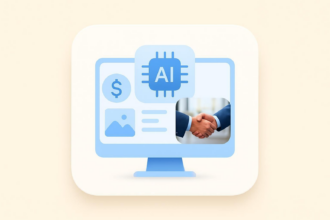







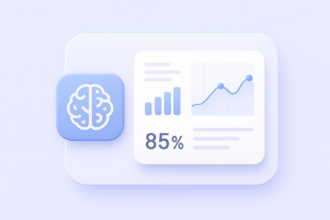


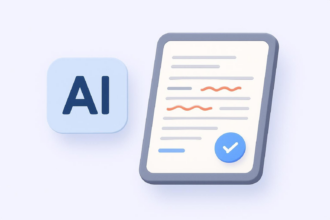






































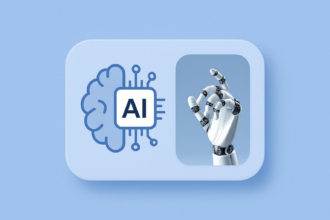




















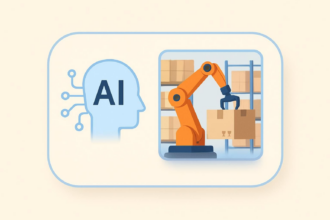







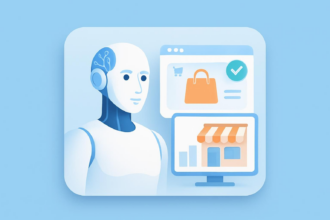

Send Comment: